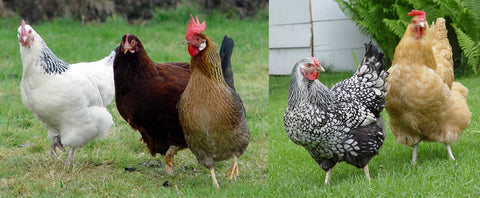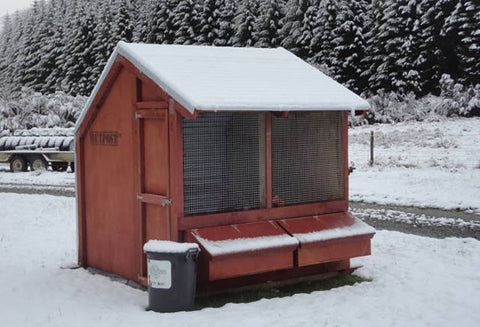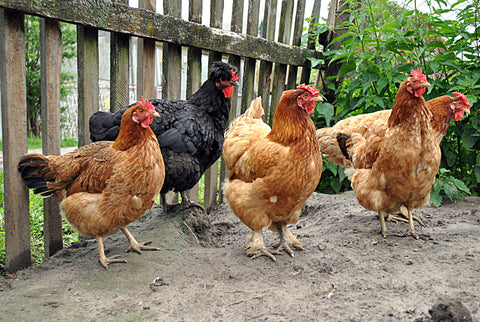There's nothing quite like popping down the garden to fill up your egg basket for a tasty breakfast omelette and being greeted by the gentle clucking of your favourite feathered friends.
And if you've been to the supermarket lately and seen the price of eggs, or struggled to get your hands on some, then no doubt you'll be even happier to see what your feathered friends are producing!
The egg shortage isn't expected to end in a hurry so if one of your New Year's resolutions is to save money - or maybe even make money - then having your own chooks might just be the best place to start!
Did you know that there are over 118 million chickens in New Zealand? That’s almost 24 birds for every man, woman and child living in the country, made up of a mix of hens that lay eggs, meat birds and, increasingly, chickens kept in a backyard, residential garden, or on a lifestyle lot.
Yes, keeping chickens is a time-honoured tradition in New Zealand, providing caring keepers with more fresh eggs than they often know what to do with - but it’s more than that. Chickens are full of energy and personality, and often they end up closer to being pets than actual livestock for a lot of owners.
How many chickens do I need? How long does it take to get eggs? Do I need a rooster? What type of chickens should I get? What are the regulations?
No doubt there's all sorts of questions running through your mind before setting up your own flock. If you’re interested in getting your own chickens, getting started is easy. All you need to do is follow this quick guide, and you could be making an omelette with your own home-grown eggs in no time.
Local Council Regulations on Keeping Chickens
Depending on where you live in New Zealand, there may be different rules on keeping backyard chickens. It'll be important to learn these regulations before you begin. Here are a few of the biggest councils and their views on keeping chickens.
|
Auckland |
Christchurch |
Dunedin |
Wellington |
|
|
Do you need permission to keep chickens? |
No, with limits on numbers. |
No. |
No, with limits on numbers. |
No, with limits on numbers. |
|
Can you keep hens in a residential area? |
Yes, but you need permission for roosters. |
Yes, but you need permission for roosters. |
Yes, but you need permission for roosters. |
Yes, but you need permission for roosters. |
|
How many chickens can you have in your backyard? |
Up to 6 on a property below 2,000 square metres. Up to 12 on a property larger than 2,000 square metres. No restrictions for rural properties or those larger than 4,000 square metres. |
No strict limits, but they must not cause a nuisance. |
No strict limits, but they must not cause a nuisance. |
Up to 8 chickens. |
|
Can neighbours complain about chickens? |
Yes. |
Yes. |
Yes. |
Yes. |
Many councils will also have explicit rules (or at least recommendations) for how your chickens should be cared for. This includes strict requirements, such as Auckland Council’s rules on chicken coop construction:
Chickens should have access to an area of land greater than three square metres and include:
- an enclosed rainproof chicken coop for sleeping and laying eggs
- at least 30cm of roost or perch per chicken
- a minimum roof height of 60cm
- a surface for pecking and scratching
- a secluded nesting area.
GET A FREE COPY OF OUR CATALOGUE
Other councils may have less prescriptive rules and more recommendations for proper poultry care and keeping healthy chickens.
Wellington Council has an excellent poultry fact sheet that covers a lot of different scenarios and provides great advice such as where you should put your chicken coops, what to feed your chickens, and how disputes with your neighbours would be resolved.
It also acts as a good rule of thumb for you to get started with your chickens. But remember to check with your own local council rules to ensure that everything is up to scratch.
One last thing: you’ll need to do everything expected for general animal welfare as well. A big part of that is keeping your coops clean. We’ve got some tips and guidance for that in our dedicated article on tips for cleaning your chicken coop.
Now that’s out of the way, let’s get to the fun part!

How to choose a space and a coop for your chickens?
If you’re going to keep chickens, you’ll need somewhere to keep them! Happier, healthier chickens have plenty of space to run around in, with well-designed, sturdy shelter that keeps the heat in and the rain out.
Chickens don’t need a huge amount of space, which is part of why urban chickens work so well, but they’ll at least need access to an enclosed area or chicken run for them to roam, forage, take dust baths and generally do chicken-y things. Ideally, this enclosed area will include plenty of fresh grass for them to dig around in.
Try to keep big items like stumps or playhouses or anything like that out of the run - your chickens will happily climb these and leap over the fence if they’re feeling adventurous. This can cause significant issues like chickens ending up in the road, in the home, or in the swimming pool (the chlorine is very bad for them).
They’ll also need a coop to roost and produce eggs in, so ensure that the coop you choose has dark nest boxes for any broody hen and enough roosting perches for the number of hens you have. Chickens like to sleep close together, so you won’t need enormous amounts of sleeping space. Our catalogue outlines how large a flock each of our chicken coops is suitable for.
Do chicken coops require planning permission?
Generally speaking, chicken coops won’t require planning permission. They are considered “low risk” construction work, so they get an exemption under recent regulation changes, provided they fit a few requirements around size, use and how they’ve been designed/constructed.
If you’re planning to buy an Outpost chicken coop, the vast majority of our kitsets won’t require consent. One less headache to worry about!
Can chickens stay in the coop all day?
Sometimes, particularly during bad weather, your chickens may decide to stay in the coop rather than roam. As long as they have access to food, water, roosting areas and nesting areas, this shouldn’t be cause for concern.
If your birds stay in the coop all day, we still recommend that you lock them into their coop at night for their own safety, protection and comfort. You can let them out again (or at least give them the option to do so) the following morning.
Do chickens need heat in the winter?
Unless you’re living somewhere truly cold in New Zealand (i.e. temperatures regularly drop below -9 degrees Celsius), it’s unlikely you’ll need to heat your coop in winter. Chickens are hardy animals and are very capable of thriving even during temperatures that would make you go and put a coat or two on.
However, the best indicator of warmth is your chickens themselves. If they look uncomfortable in the cold, you can try shifting your coop to place it in direct sunlight and ensure the ventilation window isn’t pointing towards incoming wind at night.
It’s generally a good idea to feed your birds with some supplementary protein (think dried mealworms) and carbs (discarded bread and rice) in the winter to help them bulk up against the cold.
Important note: if you have young chickens, either from breeding or from hatching eggs, you’ll need to be more careful about keeping the temperatures higher. Birds from about 5 weeks old are beginning to get big enough to head to the coop from the brooder, but it’s better for them to stay indoors where it’s warm.

Where to get your chickens
Whether you’re keeping chickens for egg laying, for home kill or just for pets, there are plenty of places you can source your new tenants from.
- TradeMe. People sell chickens and even give them away for free on TradeMe. This is also a great place to find used chicken accessories if you don’t want to buy new.
- Local farmers. Some local farmers will happily sell you a handful of hens, especially if they’ve recently hatched a new batch and have more than they need.
- Breeders. Some of the rarer breeds of chicken can be sourced from breeders.
- SPCA and rescue groups. If you want to give ex-battery hens and other rescued birds a forever home, these are a great place to get them from.
No matter where you get them from, remember that chickens are highly social animals. You shouldn’t buy just one - try to get at least three hens. Keeping chickens isn’t especially expensive, particularly if you go for a DIY kitset coop, and neither is buying them. Some hens go for as little as $5 each.
Are chickens noisy and smelly?
Short answer: Yes, chickens are noisy and smelly. But some breeds are a lot less noisy and smelly than others.
If you’re getting backyard chickens, you should look into these breeds to avoid annoying your neighbours:
- Brown Shaver
- Buff Orpingtons
- Cochins
- Barred Rock
- Mottled Java
- Ameraucanas
- Rhode Island Reds
These are the quieter breeds, and Buff Orpingtons are also probably some of the most human-friendly breeds. They often enjoy interacting with their owners, being stroked and picked up without too much fuss.
Remember that no matter what breed you get, they’ll be producing waste and making noise (especially when laying), so keep them away from fences and your neighbours’ properties to be a responsible chicken owner.

What to feed your chickens
While chicken feed will satisfy a lot of the needs of your chickens, it won’t satisfy all of them. Chickens need a wide range of different nutrients and minerals to thrive and lay better, tastier eggs.
Supplement your chicken feed with green leafy vegetables and the occasional helping of table scraps, as well as things like oyster grit for better digestion. Chickens also eat bugs and worms from the garden, so make sure that they have access to grass, and that you rotate this access from time to time, giving them new ground to scratch and forage in.
Will I get rats if I keep chickens?
It’s not just chickens that love chicken feed. Rodents are big fans of the spill that chickens can leave behind, so you may find that, without proper attention, you’ll end up attracting mice and rats with the food left behind.
The key is how you feed your chickens. Rather than simply scattering the food on the floor, you can invest in special chicken feeders that keep the food in, the rats out, and the chickens better fed. This will reduce your chances of attracting pests.
Can chickens be left alone for a week?
Generally, chickens are quite independent and will care for themselves adequately. If you have an automated chicken feeder, there’s a certain amount of time that you can just leave them to it.
However, we don’t recommend leaving your chickens for an extended period. Thankfully, chickens are fairly easy to care for as long as you have a good coop and a secure chicken run, so asking a friend or relative to check in on them every day or so won’t be a big ask.
Interested in starting your own flock? A solid chicken coop is a great place to start. Here at Outpost Buildings, we’ve got DIY kitset chicken coops of every size and shape you can imagine, from tiny coops perfect for making the most of a small garden, right up to mighty commercial-sized constructions for hundreds of birds. Check out our catalogue to get started!
If you have any additional question, get in touch with one of the team here at Outpost Buildings





